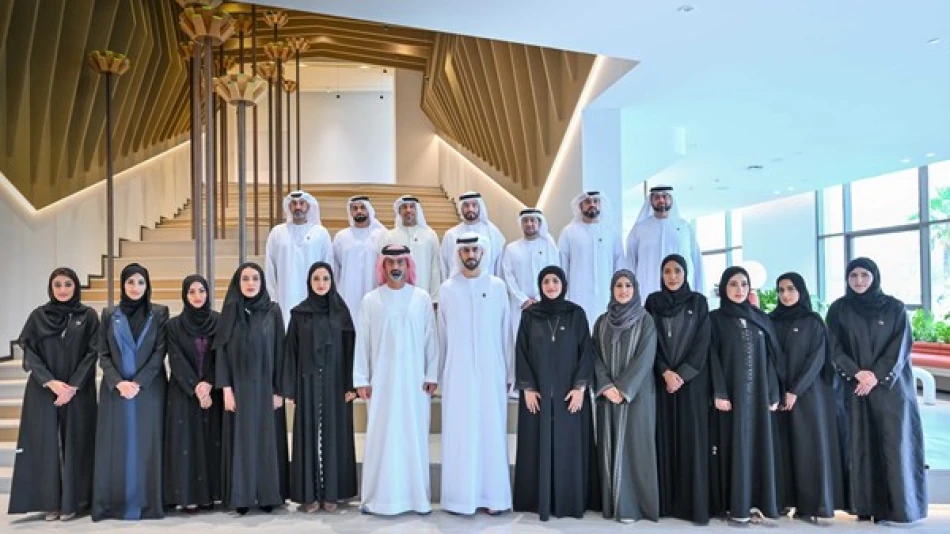
Ammar Al Nuaimi Welcomes Participants of 'UAE Government Leaders 2025' Program
UAE Doubles Down on Leadership Development as Regional Competition for Talent Intensifies
The UAE is accelerating its national leadership development initiatives through the "UAE Government Leaders 2025" program, with Crown Prince Sheikh Ammar bin Humaid Al Nuaimi of Ajman emphasizing that building influential national leaders requires long-term investment in Emirati talent. This strategic focus comes as Gulf states increasingly compete to develop homegrown leadership capabilities amid rapid global economic transformation.
Strategic Investment in Human Capital
During a recent meeting with program participants at the Ajman government headquarters, Crown Prince Sheikh Ammar outlined the UAE's commitment to developing leaders who can maintain their national identity while effectively engaging with global changes. The initiative, operating under the slogan "UAE is Our School," represents a comprehensive approach to leadership development that goes beyond traditional training programs.
The Crown Prince emphasized that the UAE, under President Sheikh Mohamed bin Zayed Al Nahyan's leadership and with support from Vice President Sheikh Mohammed bin Rashid Al Maktoum, prioritizes human capital investment as a cornerstone of national development. This approach positions young Emirati talent at the forefront of decision-making across various sectors.
Beyond Traditional Leadership Training
The program's methodology focuses on self-directed learning and exposure to global best practices, distinguishing it from conventional leadership development approaches. Participants engage in specialized workshops that examine decision-making challenges, leadership personality formation, and strategies for creating meaningful national impact aligned with the country's future ambitions.
Regional Context and Competitive Positioning
This leadership development push reflects broader regional trends where Gulf states are investing heavily in human capital development. Similar to Saudi Arabia's Vision 2030 leadership initiatives and Qatar's National Vision 2030, the UAE recognizes that sustainable economic diversification requires a pipeline of capable national leaders who can navigate complex global environments.
Omar Sultan Al Olama, Minister of State for Artificial Intelligence, Digital Economy and Remote Work Applications, noted that the UAE government has become a global model for modern, advanced governments prepared for the future. This positioning is crucial as the UAE competes with Singapore, Switzerland, and other innovation hubs for global talent and investment.
Implications for Government Efficiency and Innovation
The program's emphasis on integrated government systems working as "one team" addresses a critical challenge facing many rapidly developing nations: ensuring coordination across federal and local government levels. By developing leaders with complementary capabilities, the UAE aims to create a unified approach to comprehensive and sustainable development.
Future-Ready Leadership Capabilities
The program's latest iteration, version 2.0, incorporates advanced solutions for leadership preparation and capacity building, including transformational project management skills. This focus on transformation management is particularly relevant as the UAE navigates post-oil economic diversification and positions itself as a global hub for emerging technologies.
Long-term Strategic Value
The Crown Prince's emphasis on leaders who can "influence and interact with global changes" while maintaining national identity reflects a sophisticated understanding of modern leadership challenges. As global economic power shifts and new technologies reshape governance, countries that successfully develop adaptive, culturally-grounded leadership will maintain competitive advantages.
This investment in leadership development represents more than human resource planning—it's a strategic bet on the UAE's ability to maintain its position as a regional hub while building the institutional capacity necessary for long-term prosperity. The program's focus on direct engagement between emerging leaders and decision-makers creates knowledge transfer mechanisms that could prove crucial for maintaining policy continuity and innovation momentum.
For investors and international partners, the UAE's systematic approach to leadership development signals institutional stability and long-term strategic thinking, factors that become increasingly important as regional geopolitical dynamics continue to evolve.
Most Viewed News

 Layla Al Mansoori
Layla Al Mansoori






